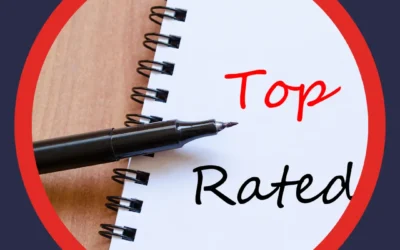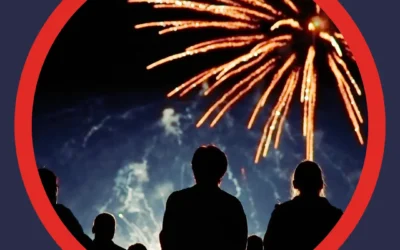Who doesn’t love the 4th of July? Sunny weather, time with friends and family, lots of summer food…and, of course, fireworks. While fireworks are a quintessential part of enjoying the 4th of July holiday, they pose significant risks to your hearing. Fireworks and hearing loss are closely linked, often affecting festive celebrations. Understanding this connection can help you enjoy festivities safely.
Stay tuned as we explore how fireworks can impact hearing, answer common questions, and offer practical advice for protecting your ears during celebrations.
Can Fireworks Affect Hearing?
Fireworks and hearing loss are closely connected due to the high decibel levels fireworks produce. Noise from fireworks can reach up to 175 decibels. For context, this is louder than a jackhammer (130 dB) or a jet plane taking off (150 dB).
Loud noises over 120 decibels can cause immediate harm to your hearing. Fireworks can easily surpass this threshold, producing sound between 150 and 175 decibels. Each year, many people experience hearing damage from fireworks.

Factors Affecting Fireworks and Hearing Loss
- Distance from the Sound Source: The farther away from the explosion you are, the less impact it has on your hearing.
- Loudness of the Firework: The World Health Organization advises adults to avoid exposure to sounds above 140 decibels. For children, the limit is 120 decibels.
To illustrate, if a firework explodes at 170 decibels, you should stand 15 to 20 meters away to be safe. Children need to stand 50 to 60 meters away from the same firework. Infants should not be exposed to fireworks as they experience the most significant sound pressure.
By understanding these factors, you can better protect your hearing during fireworks displays.
Can Fireworks Cause Hearing Damage?
According to the American Academy of Audiology, even short-term exposure to sounds exceeding 140 dB can cause immediate and permanent hearing loss.
The Damage Done
Hearing damage from fireworks can manifest in several ways:
- Temporary Hearing Loss: This might involve muffled hearing or a feeling of fullness in the ears after exposure. It usually improves within a few hours or days.
- Permanent Hearing Loss: Repeated exposure to loud noises, including fireworks, can damage the delicate hair cells in the inner ear, leading to permanent hearing loss.
- Tinnitus: This is a ringing, buzzing, or hissing sound in the ear that can occur after exposure to loud noises like fireworks. Tinnitus can be temporary or permanent.
The Bottom Line on Fireworks and Hearing Loss
Yes, fireworks can definitely cause hearing damage. The loud noises they produce can damage the ear’s delicate structures, leading to temporary and permanent hearing loss. Understanding these risks helps you enjoy fireworks safely.
How Long Does Tinnitus Last After Fireworks?
Tinnitus is a common side effect of exposure to loud noises. The loud blasts can irritate the hair cells in your inner ear, leading to the perception of ringing or other sounds even when there’s no external noise present.
The Duration of the Ring
The good news is that tinnitus caused by fireworks exposure is often temporary. In most cases, the ringing should subside within a few hours or days, especially if you take steps to protect your ears from further noise exposure.
Here’s a breakdown of how long tinnitus might last after fireworks:
- A Few Hours: The most common scenario. The ringing might be present for a few hours after exposure but fades away on its own.
- 1-2 Days: Sometimes, the ringing might persist for a day or two, especially if the fireworks exposure was significant.
- Longer Duration: If the ringing persists for more than a few days or worsens, see a doctor to rule out any underlying causes.
Important Note: Consult a doctor if your tinnitus is severe, persistent, or accompanied by other symptoms like hearing loss or dizziness.

How Do I Stop My Ears From Ringing After Fireworks?
While tinnitus usually resolves on its own, here are some tips to help it subside faster:
- Get Some Quiet: Avoid further exposure to loud noises and allow your ears time to rest and recover.
- Relaxation Techniques: Managing stress and anxiety can sometimes help alleviate tinnitus symptoms. Practices like deep breathing or meditation might be beneficial.
- Over-the-Counter Pain Relief: Pain relievers like ibuprofen or acetaminophen can help manage any discomfort associated with tinnitus.
- Lower the Volume: Avoid in-ear headphones and keep TV or radio volumes lower than usual.
- Distraction: Distract the ears from ringing by listening to soft music or engaging podcasts.
- Reduce Stress: Meditation and yoga can help reduce stress, which can contribute to tinnitus.
- Head Tapping: Place palms over the ears and fingers at the base of the skull. Raise index fingers and tap the back of the head to produce a drum-like sound. Tap gently around 50 times and repeat a few times daily as needed for relief.
- Reduce Alcohol and Caffeine: Cutting back on alcohol and caffeine might help reduce tinnitus symptoms.
Understanding how to manage the effects of fireworks on your hearing helps ensure you enjoy celebrations safely.
Learn more about what helps with tinnitus.
When Should You See a Professional After Fireworks Exposure?
While tinnitus often resolves on its own, there are times when professional medical attention is necessary. Here’s when to see a doctor:
When to Seek Professional Help
- Ringing Persists for More Than a Few Days: If the tinnitus lasts beyond a few days, a doctor’s evaluation is crucial.
- Severe or Worsening Ringing: If the ringing is very loud or worsens over time, seek professional medical attention.
- Accompanied by Other Symptoms: If you experience hearing loss, dizziness, or ear pain alongside the tinnitus, consult a doctor to rule out underlying conditions.
What to Expect at the Doctor’s Appointment
- Physical Exam of the Ear Canal: Doctors will check for excess earwax or foreign objects that could cause tinnitus.
- Assessment for Ear Infections: Doctors will check for signs of an ear infection.
- Evaluation of Stress Levels and Medications: Doctors will ask about stress levels and any medications you take.
Tinnitus influenced by these factors should clear up once you treat the underlying condition. In cases of chronic tinnitus, doctors can recommend hearing devices or medications to help ease symptoms.
Remember: Early Intervention is Key
If your tinnitus is concerning, don’t hesitate to see a doctor. Early diagnosis and treatment can help manage symptoms effectively. Understanding when to seek professional help ensures you take the right steps to protect your hearing health.
Protect Yourself From Fireworks and Hearing Loss
Fireworks and hearing loss are a significant concern during festive celebrations. You can protect your hearing and enjoy the spectacle safely by taking a few precautions. Here are five ways to safeguard your ears:
-
Keep a Safe Distance
Maintaining a safe distance from the fireworks display reduces the risk of hearing damage. Aim for a distance of around 500 feet. This distance still offers a great view while minimizing harmful sound pressure.
-
Skip Home Displays
Attend community fireworks displays instead of setting off your own. These events have roped-off areas at safe viewing distances, protecting your hearing and ensuring safety.
-
Use Ear Protection
- Earplugs: Foam earplugs work well for adults.
- Earmuffs: They are better for children, as they cover the ears entirely and are safer than earplugs.
-
Choose Quieter Fireworks
If you plan your own display, select quieter fireworks. Options like fountains, wheels, falling leaves, and comets offer spectacular visuals without loud booms. Fireworks come with noise level ratings, so choose those with lower ratings.
-
Avoid Loud Fireworks
Avoid fireworks like rockets, mines, and those with many blasts strung together. These are designed to produce maximum noise and can damage hearing.
Shielding Your Ears
To protect your ears during fireworks displays, follow these steps:
- Distance is Key: Keep at least 500 feet away from the fireworks launch site.
- Ear Protection: Wear earplugs or earmuffs with a noise reduction rating (NRR) of 25 dB or higher.
Protecting Children’s Ears
Children’s ears are more susceptible to noise damage. Here’s how to safeguard their hearing.
- Minimize Exposure: Limit the time children spend near fireworks.
- Proper Ear Protection: Use child-sized earplugs or earmuffs.
- Lead by Example: Wear ear protection yourself and teach children its importance.
By following these steps, you can create a safe and enjoyable experience for yourself and your loved ones during fireworks celebrations.
Get more tips on protecting your hearing health.

Enjoy the Fireworks, Avoid the Damage
Fireworks and hearing loss are closely linked, but you can enjoy celebrations safely with the proper precautions. Remember to keep a safe distance, use ear protection, and choose quieter fireworks to protect your hearing.
Key Takeaways
- Maintain a distance of at least 500 feet from fireworks.
- Use earplugs or earmuffs for effective noise reduction.
- Choose quieter fireworks for less noise impact.
- Limit children’s exposure and ensure they wear proper ear protection.
Enjoy the dazzling displays without compromising your hearing health. If you need personalized hearing protection or have concerns about your hearing, contact American Hearing + Audiology. We’re here to help you safeguard your hearing and enjoy every celebration.
Contact American Hearing + Audiology for expert advice on hearing protection. Protect your ears and enjoy the festivities!



